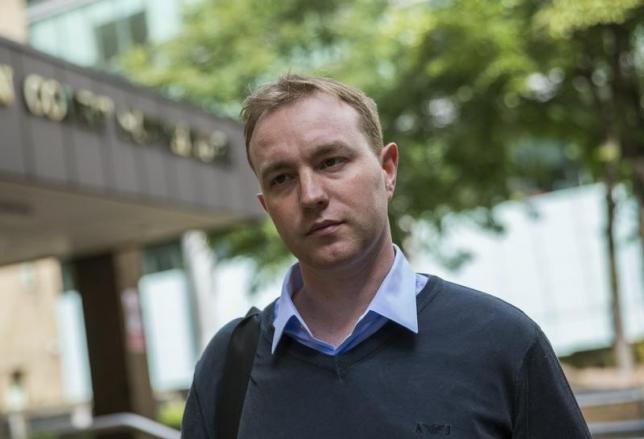'Near-suicidal' Libor trader Hayes says anger drove plea change

LONDON - Tom Hayes, the ex-trader charged with manipulating Libor, told a London court on Monday he had been near-suicidal when he initially agreed to cooperate with investigators and plead guilty, but anger over his fate led him to change his mind.
Asked by a prosecutor if he had understood that the cooperation agreement he signed in 2013 with Britain's Serious Fraud Office (SFO) meant that he would become a "supergrass" implicating others, Hayes said he did not consider the information he provided as incriminating.
The former yen derivatives trader at UBS UBSG.VX and later Citigroup C.N eventually pulled out of the SFO agreement and pleaded not guilty to eight counts of conspiracy to defraud between 2006 and 2010.
The Briton is the first person to stand trial in a global scandal that has resulted in banks being fined billions of dollars over alleged rigging of benchmark interest rates.
Used to price $450 trillion of financial products worldwide, the London interbank offered rate, or Libor, is an average interest rate calculated from submissions by a panel of banks.
Prosecutors say that Hayes persuaded brokers and traders to influence rates in ways that suited his trading positions. His defence is that he was open about his attempts to influence rates, that it was common practice and that senior managers were aware of it.
In the months following his arrest in December 2012, Hayes underwent 82 hours of interviews with SFO investigators, during which he made what prosecutor Mukul Chawla has described in court as "full confessions" about Libor manipulation.
TERRIFIED
Hayes has repeatedly said that he was terrified of being extradited to the United States and wanted to be charged in Britain. He has said that was why he admitted to the SFO during his 2013 interviews that he had been dishonest.
"You know what? It's disgusting that I was forced into this situation by the U.S. government," he told Southwark Crown Court on Monday, the first day of his cross-examination by Chawla.
Repeatedly pressed on why he signed the agreement with the SFO and agreed to plead guilty, Hayes said he was "near-suicidal" and "having a breakdown" at the time.
He said that over time he became increasingly angry about the prospect of pleading guilty when he had only been trying to do a good job and felt he was being made a scapegoat to protect more senior figures who had known all about rate-rigging.
Chawla pressed Hayes on details he provided in the SFO interviews about other brokers and traders with whom he is accused of colluding, asking if he had understood that he had become a "supergrass".
Hayes said he had not seen that as incriminating anyone else, that his role had merely been to give information and that he could not be the judge of whether what he said was incriminating or not because that was a decision for the SFO.
When asked by Chawla if he thought it was acceptable to manipulate financial situations to make money, Hayes said that with regards to broking it was industry practice.
"There's been a lot made of honesty and dishonesty, but you don't give it a considerable amount of thought," he said. -Reuters







